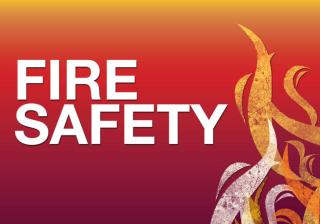Fire Safety Tips

Most fires happen where we feel safest - our homes. But everyone can act to prevent and to survive fires. Working smoke alarms and a practiced home escape plan provide the best protection in a home fire. In most fires, you have as little as 3 minutes to escape once the smoke alarm sounds.
- Indoor fire safety
- Home escape plans - Learn to create and practice a home escape plan.
- Cooking fire safety - Cooking is the #1 cause of fires in the home and the leading cause of fire-related injuries. It is also the leading cause of fire injuries for seniors. Learn about preventing cooking fires and about preventing burns and scalds.
- Winter home heating safety - More home fires happen in winter and heating is a leading cause. Learn about winter home heating safety. Promote winter safety in your community. Use our Keep Warm, Keep Safe Winter Home Heating Safety Campaign.
- Electrical fire safety - Electrical fires are often deadly. Learn how to use electricity safely and prevent these fires.
- Outdoor fire safety - Learn how to stay safe when you burn yard waste, use generators, and grill food. Learn to apply mulch and dispose of oily rags safely. Learn to stay safe on the ice and when you are exposed to cold water.
- Seasonal fire safety
- Smoke and carbon monoxide alarms - Smoke alarms are your first line of defense in a fire. They provide early warning of danger so you can use your home escape plan to get out fast. Have working smoke alarms on every level of your home and within 10-feet of every bedroom. Learn about smoke and carbon monoxide alarms.
- Home fire sprinklers - Learn how home fire sprinklers can protect your family in a fire.
- Smoking fire safety - The leading cause of fire deaths is smoking. Learn how to dispose of smoking materials safely.
- Fire Safety for Newcomers. A booklet about home fire safety.
Smoke and Carbon Monoxide Alarms
Every home is required to have working smoke alarms and most are also required to have carbon monoxide alarms. Learn what kind you need to have and where they should be placed in your homes. Visit the Massachusetts Department of Fire Services to learn more.
- National Fire Protection Association Safety Materials for People who are Deaf or Hard of Hearing
- Carbon Monoxide (CO) Safety
Open Burning and Fire Pit Safety
Home fire safety doesn’t stop at the door. There are many fire risks outside the home. You may have these in your backyard. Here are some ways you can keep your home safer from outside fire. Learn more about Open Burning Safety.
- An adult should always be present and attend to the fire until it is completely extinguished.
- Keep children and pets a safe distance away.
- If the fire gets out of control, call the fire local department right away.
- Put the fire out if winds pick up or the weather changes.
- Keep fire-extinguishing materials handy. Some good options are a fire extinguisher or a garden hose. And test the water source before lighting the fire.
- Keep any flammable and explosive materials away from the fire.
- Be careful of the wind power and direction.
- Keep a safe distance from the fire pit.
- Don’t add too much wood to the fire at once, it can fall from the pit.
- Don’t leave the fire pit unsupervised.
- When you are done extinguish the fire.
Grill Safety
Most people like to grill in the summer. But every year grilling fires cause injuries and property damage. Learn to grill safely.
Fireworks Safety
Be smart. Leave fireworks to the professionals. Illegal fireworks start fires and cause serious injuries to residents every year. Learn to enjoy fireworks safely.

